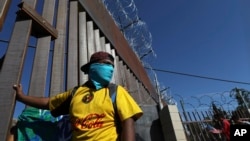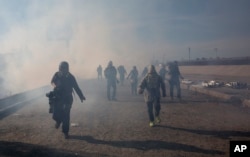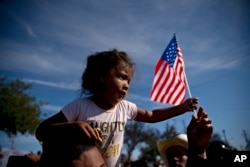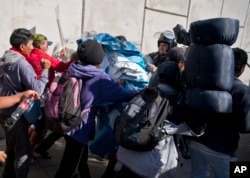A chaotic border clash with choking tear gas fired by U.S. agents left Central American migrants sullen and dejected, with some opting Monday to leave and others worrying the incident may have spoiled their chances at asylum.
Mexican security forces stepped up their presence at a Tijuana sports complex where thousands from the migrant caravan have been sheltered, apparently seeking to avoid a repeat of Sunday's ugly scene. Police blocked the migrants from walking toward the border in the morning, though later on they allowed them to move about freely.
Isauro Mejia, 46, from Cortes, Honduras, went looking for a cup of coffee to shake the morning chill following another night sleeping outside after being caught up in the clashes. Before, he had hoped to be able to press an asylum claim, but now he wasn't so sure.
"The way things went yesterday ... I think there is no chance,'' Mejia said. "With the difficulty that has presented itself because of yesterday's incidents ... that's further away.''
Migrants hoping to apply for asylum in the United States must put their names on a waiting list that already had some 3,000 people on it before the caravan arrived in Tijuana. With U.S. officials processing fewer than 100 claims a day, the wait time for the recent arrivals stands to take months.
That has instilled a sense of desperation among many after their grueling trek from Central America. Sunday's incident began after hundreds marched to the border to try to call attention to their plight. Some attempted to get through fencing and wire separating the countries, prompting volleys of stinging gas.
Cindy Martinez of San Vicente, El Salvador, said she had been about to cross the concertina wire to the U.S. side when the tear gas was launched. She estimated about 20 people had already passed in front of her, and parents begged agents not to unleash the gas because there were young children present.
"I see it as impossible for them to want to give us asylum,'' she said. "Because of the words that President Donald Trump has said, I think this is impossible.''
Martinez, 28, said she was now considering getting work in Tijuana.
Mexico's National Migration Institute reported that 98 migrants were being deported after trying to breach the U.S. border. The country's Interior Department said about 500 people attempted to rush the border, while U.S. authorities put the number at 1,000.
U.S. Customs and Border Protection Commissioner Kevin McAleenan said 69 migrants who tried to cross illegally were arrested on the California side. He said the Border Patrol's use-of-force policy allows agents to use tear gas and other non-lethal methods, but the incident would be reviewed.
"As the events unfolded, quick, decisive and effective action prevented an extremely dangerous situation,'' McAleenan said.
Mexico's Foreign Relations Department said it had presented a diplomatic note to the U.S. Embassy asking for an "exhaustive investigation'' of the use of nonlethal force.
Migrant Yanira Elizabeth Rodriguez Martinez said she, her daughter and her sister had stayed away from Sunday's demonstration because they feared it could turn dangerous. Sitting in their makeshift camp at a sports complex Monday, the 38-year-old asked what the process would be if she decided to return to El Salvador.
"Because of (the actions of a few), we all pay,'' said Romario Aldair Veron Arevalo, a 20-year-old friend sitting with her. He said he still hoped to cross to the United States and work, but conceded it could be more difficult now.
In a rare criticism, Mexico's National Human Rights Commission admonished migrants that they "should respect Mexican laws and not engage in actions that affect the communities they pass through.''
"It is important to note that the fact the Mexican government protects their rights does not imply a free pass to break the law,'' it said.
Commission official Edgar Corzo Sosa said after visiting the shelter Monday that the space intended for 3,500 is now crowded with more than 5,000 people.
He said officials were receiving more requests from migrants wanting to return to their countries, but did not have a number. He said a beefed-up police presence was for the migrants' safety.
"There is nothing to prevent them from leaving'' the shelter Corzo said. "They are free to come and go.''
The clash also led U.S. authorities to shut down the nation's busiest border crossing at San Ysidro, California, for several hours Sunday.
"Mexico should move the flag waving Migrants, many of whom are stone cold criminals, back to their countries,'' Trump tweeted Monday. "Do it by plane, do it by bus, do it anyway you want, but they are NOT coming into the U.S.A. We will close the Border permanently if need be. Congress, fund the WALL!''
Trump has repeatedly suggested without evidence that the migrant caravans are full of hardened criminals, but they appear to be mostly poor people with few belongings fleeing poverty and gang violence.
U.S. and Mexican officials have been wrangling over migration and how to deal with asylum-seekers at the border as Tijuana, a border city of 1.6 million residents, struggles to accommodate the crush of migrants.
Mexican President-elect Andres Manuel Lopez Obrador, who takes office Saturday, declined Monday to comment on the border incident.
Asked about Trump's warning that the U.S. could close the border "permanently'' - which would disrupt billions of dollars in trade - Marcelo Ebrard, who is to be Lopez Obrador's foreign relations secretary, said, "Let's hope we can keep that from happening.''
On Monday, Trump said Vice President Mike Pence and daughter Ivanka Trump plan to attend Mexico's presidential inauguration.
The White House has said Trump has developed a "strong relationship'' with Lopez Obrador and looks forward to working with him.
Tijuana public safety secretary Marco Antonio Sotomayor Amezcua said in a news conference that Mexican police would be prudent in their use of force, but "we have to guard at all cost that the border posts are not closed again.''
Sotomayor said he hopes migrants who had thought of entering the U.S. illegally learned from Sunday's events that that won't be possible. He added that the mayor is working to secure another space for the migrants with the sports complex overflowing.
Baja California state Gov. Francisco Vega said almost 9,000 migrants were in his state - mostly in Tijuana, with a smaller number in Mexicali - and called it "an issue of national security.'' Vega issued a public appeal to Mexico's federal government to take over responsibility for sheltering the migrants and deport any who break the law.
Alex Castillo carried a red bedroll slung over his shoulder as he walked away from the Tijuana shelter Monday, saying he would head to the industrial city of Monterrey to look for work and try to cross into the United States next year.
The 35-year-old electrician from Tegucigalpa, Honduras, said he wasn't at the border clash. He heard about it from others and decided to leave "to avoiding getting beaten.''
"If they're launching tear gas,'' Castillo said, "it's better to head somewhere else.''







